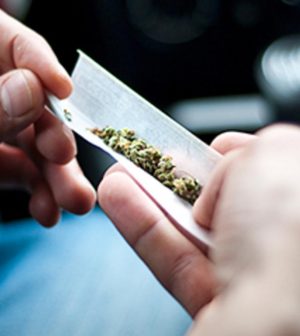- Could Your Grocery Store Meat Be Causing Recurring UTIs?
- Are You Making This Expensive Thermostat Error This Winter?
- Recognizing the Signs of Hypothyroidism
- 10 Strategies to Overcome Insomnia
- Could Artificial Sweeteners Be Aging the Brain Faster?
- Techniques for Soothing Your Nervous System
- Does the Water in Your House Smell Funny? Here’s Why
- Can a Daily Dose of Apple Cider Vinegar Actually Aid Weight Loss?
- 6 Health Beverages That Can Actually Spike Your Blood Sugar
- Treatment Options for Social Anxiety Disorder
Why Teens Use Marijuana: Study Finds It’s Not Just About Getting High

Teens who avidly use weed typically use it either for enjoyment or to cope, but both uses have a dark side to them, new research finds.
Teenagers who use marijuana for enjoyment or to forget their problems have more demand for it, meaning that they are willing to both consume more weed when it’s free and spend more money to obtain it, researchers said.
These same teens also tend to report negative consequences from cannabis use, including increased anxiety, decisions they later regretted, difficulty remembering things or concentrating, foolish or goofy behavior and trouble with school or an employer.
“We know that earlier onset of cannabis use is associated with the likelihood of developing a cannabis use disorder,” said lead researcher Nicole Schultz, an assistant professor with the University of California, Davis’ department of psychiatry and behavioral sciences.
“It is important we understand what variables contribute to their use so that we can develop effective strategies to intervene early,” Schultz added in a university news release.
Weed is the drug most widely used among teens, with nearly 31% of 12th graders using it within the past year and more than 6% using it in the past month, researchers said in background notes.
This has been at least partially driven by the marijuana legalization movement across the United States, with 24 states and the District of Columbia defying federal law to legalize cannabis for recreational use.
For this study, researchers recruited participants ages 15 to 18 to figure out why teens who use marijuana are drawn to the drug.
“The reasons often change over time. At the beginning, someone might use a substance for recreational reasons but have different motives later when the substance has become a problem for them,” Schultz said.
Three in five participants were high school students, while one in four were college students. All lived in the Seattle metropolitan area, where recreational cannabis use is legal at 21 years and older.
Participants completed an initial survey and follow-up surveys at three and six months.
Using weed for enjoyment was significantly associated with both its use and higher demand, researchers found.
The new study was published recently in the journal Psychology of Addictive Behaviors.
“This finding makes sense because using for enjoyment is typically related to the initiation of use versus problematic use,” Schultz said. “Given the age of the participants in this study, they may have short histories of use.”
Using weed to cope with feelings was tied to being willing to use more if it’s free, spending more on cannabis and accepting higher prices for marijuana.
“The current study suggests that encouraging substance-free activities that are fun for adolescents and help adolescents cope with negative feelings may help them use less cannabis and experience fewer negative consequences from use,” said senior researcher Jason Ramirez, an assistant professor of psychiatry and behavioral sciences at the University of Washington.
More information
The U.S. Centers for Disease Control and Prevention has more about teens and marijuana.
SOURCE: University of California, Davis, news release, Dec. 13, 2023
Source: HealthDay
Copyright © 2026 HealthDay. All rights reserved.










